ALPINKATZEN
The music from Bad Goisern in Münster
In the Salzkammergut you can be yodel-rocked!
Münster. The drummer's arm was in a bandage, but otherwise the postponed concert from the Austrian yodel rocker Hubert von Goisern and his Alpinkatzen got straight to the point in Münster's Jovel. Which means, the rock music is coming!
To make it clear: the lively Hubert from Bad Goisern doesn't care at all about any shaggy allegedly "merry musicians". Instead of lederhosen nonsense, the six-pack from the Salzkammergut offered powerful rock songs and yodels with lyrics in broadest homeland dialect. Fetching the folk music from the ghetto of the edelweiss drinking songs and dumb knaves of hearts and developing them in a contemporary fashion - this is laudable task is an affair of the heart for the likeable Hubert von Goisern.
He sweats and toils like a berserker at the accordion for it, with two drummers behind him, and to the baffled listeners in the Jovel he presents his version of the Küahmelcher, a traditional yodel when driving cattle onto the pasture. Holdi-oudi - he whoops and yodels in such a way that it must be a true joy to be born a cow in Goisern.
But there hasn't been a holy alpine world in the cosy high mountains for a long time: in Kokain Blues, the Alpinkatzen tell of snow that lies thinly on the fields not only in the mornings. The mixture of sentimental, thoughtful ballads and rousing yodel rock went down well - a good number of the almost one thousand northerners in the Jovel had already waved their lighters before the interval in the comforting cuddling sounds.
Then Sabine Kapfinger lets rip, Hubert's singer. The twenty year old, who only wants to sing since her training as a hairdresser, jubilates in the highest yodelling tones - completely detached and with so much energy that the milk would turn to butter in the udders of the cows up on the pastures. It never seemed insincere - you simply saw the fun that all the Alpinkatzen had in making their kind of folk music. The Austrians are just more relaxed that the Germans, said frontman Hubert. The audience didn't need telling twice and clapped for three encores until the end of this homeland evening of a different kind. Enthusiasm across the board.
For the five musicians on the stage and their fantastic singer, the show in Münster was at the same time the conclusion of a three year tour. Now we have it! The band and their accompanying team could hold each other in their arms at the end - the visibly moved Hubert von Goisern, musician with heart and soul, was not ashamed of his tears.
High voltage folk musician
Hubert von Goisern and the Alpinkatzen at Burghalde
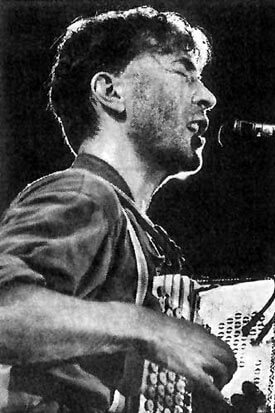 "It's
about abandoning rights, traditionalists and administrators of culture," says
Hubert von Goisern. He's right. Celebrating African, Indian and Irish
but turning up your nose at something native betrays the "citizen
of the world" and intellectual, who in silence would still like
to have his dialect, would like to know where he belongs and if envious
of other people who have no problems with that.
"It's
about abandoning rights, traditionalists and administrators of culture," says
Hubert von Goisern. He's right. Celebrating African, Indian and Irish
but turning up your nose at something native betrays the "citizen
of the world" and intellectual, who in silence would still like
to have his dialect, would like to know where he belongs and if envious
of other people who have no problems with that.
3000 people swarmed to the Burghalde, when Goisern and his Alpinkatzen made a stop there. There have already been attempts at heaving alpine music over into the modern. Shy, sensitive, funny, absurd. Evidently the time is now ripe for the decisive battle: for a steady man from the mountains, who unpacks his accordion, plugs in and roars the rock monsters ears right off.
When Hubert von Goisern lets the lush bass of his Styrian provocatively boom, they fight back. The electric guitar howls shrilly in the hands of Reinhard Stranzinger, Wolfgang Maier flogs the drums, and Stefan Engel's keyboards rumble threateningly from the background. Then the dinosaurs dance on the Burghalde stage, in big mountain boots, intoxicated by the high voltage.
Goisern says he is often asked by the purists whether that has to be the case. "Well, it doesn't have to be that way, but we like it," he cares to answer. That's okay too. Such an orgy would do many picky people good, for self-discovery, so to speak.
Mind you, other things were musically convincing. For example, the Kuahmelcher, an archaic yodel from the Salzkammergut, which Goisern puts down with the 20 year old Sabine Kapfinger. The audience is compelled to hum the undertone. The keyboard, barely audible, provides breadth.
It seizes you like the singing of Sardinian shepherds or Tibetan monks. Remarkable: the oldest pieces, sunk in almost mystical darkness, are also the most modern and universal: they can be brought into the present as if they are lying in the past, but are had wandered into the future on the quiet and were already waiting there to be rediscovered.
Beyond that, Hubert von Goisern emerged as a veritable songwriter, warmed the heart with the ballad Weit, Weit Weg, told of thoughts which ramble home during a tour, "wia da Wind über die Schneeberg drüber waht" ("as the wind blows over the Schneeberg"). And confessed that sometimes what other people call Georgia on my mind, suddenly attacks him too, but he calls it "Goisern, Goisern, i steh auf di und ein oanfachs, abgnudelts jodleiti" ("I like you and your simple, old-fashioned jodleiti").
In between, he entertains the audience with stories, how he wanted to tell the people in Texas what a "Wuiderer" (poacher) was. Or how he got his first penal mandate when he was 16 because of forbidden electric guitar playing, because Goisern is actually called Bad Goisern and is a spa town, in which there must be quiet. Which, however, didn't prevent the rascals blasting a hole in the Ewige Wand so the guests could drive straight ahead.
Then there's another high-speed yodel and a rap that's so fast you can't understand it. A cocaine blues, where you don't know if it's autobiographical or satirical characters ("nach am Priserl is mir jede recht" ("after a pinch, anyone's all right by me")). And naturally, right at the end, the current hit Hiatamadl, frenetically cheered. Goisern pulls the squeezebox high, throws his head back, elastically flexible, jumps up onto a higher stage platform.
"The mountains are his pleasure. There he draws creative strength and new ideas for himself and his Alpinkatzen," you discover in the tour programme. No doubt: The man wants to go upwards. "Most of all, I thank you all, because without you it doesn't pay off," Goisern bids farewell to the grateful listeners.
Juchuhuhaheiiii
Alpine rap and hard rock: Hubert von Goisern and the Alpinkatzen in Meran.
Do you know what "Boschen" is? It's not clapping, that's for sure. It looks just like it. It sounds exactly like it too, but it works differently. Because it follows rules. The first rule is: "Boschen" is only allowed for men. The second: You only "boschen" in rhythm.
There are no people without rhythm. Only those who don't feel it until the fourth verse. "What's important is: if you don't feel it until the fourth verse, you only start to "boschen" at the fourth verse." Quoting Hubert von Goisern. The Meran audience started to clap quite ordinarily straightaway, as they will gladly be slammed a bit and want to express their enthusiasm without Austrian customs.
Many, who only know the hits like Hiatamadl and Heast as nit did not expect that they would then be musically slammed in such a way. Goisern foists punk rock onto yodel lovers, country dances onto the rock youth. The German tourists were dispossessed of their national anthem, because "it's our old Kaiser anthem by Josef Haydn, and because there's something so fishy about it that we play it so loud so it's right again." And "Alpine Sabine" (Sabine Kapfinger) yodels with a look on her face that would make Janis Joplin try a tremolo after the third packet of cigarettes. Her fans (mostly male) occupy the front left block.
Goisern could not forgive the people of Meran for not being able to juchizer properly. Yes, if we were in Germany, but we're in South Tyrol: "You've got Austrian blood. So we'll practise three times like the fishermen's choirs." And in every song a yodel - or a least a juchizer.
Hubert von Goisern, 40, born in Bad Goisern (like Jörg Haider), civil name: Hubert Sullivan, divorced, one child and a second on the way, favourite instrument: accordion, piccolo and beefhorn, the first record under his name, slowly gone 7 times gold (175,000) in Austria, is the one that made the yodel acceptable in polite society and the country dance fit for the disco.
This offbeat mixture, which resounds in Meran as if there had never been a doubt about its playability, earns him a full-to-bursting auditorium there and an audience between 5 and 55. A young boy approaching his teens is wearing a woolly cap with a tassel. If he had grown up in Harlem, he would be be setting fashion trends for teens. A girl, just marginally older, has two plaits like Gretl. Goisern himself, dressed all in white, with braces like Johnboy from the Waltons, is already making fashion. In between, artists like Matthias Schönweger and politicians.
They are all interested in the ground-breakingly daring which Goisern came to after travels around the world, where he dealt with exotic folk music. With the Alpinkatzen, the former Goisern brass band musician began to discover the musical roots of the alpine region, which he now rehabilitates with rare authenticity. The fact that he enforces everything with a great deal of self-irony and is also politically engaged makes him the darling of intellectuals too.
The campaigning liberals at their stand in front of the entrance didn't realise the politics: they canvas untiringly, even when, to applause, Goisern distances himself in the auditorium from xenophobia and his famous liberal fellow Goiserer.
Of snowmen and goats' balls-farmer boys
Three hours with Hubert von Goisern and the Alpinkatzen
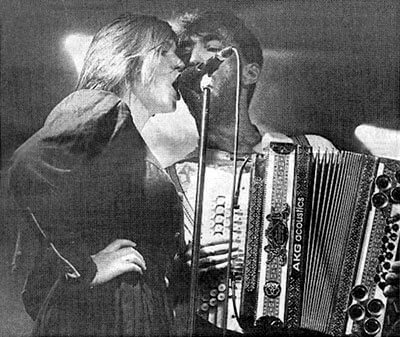 He
was last in the Fugger city in May, in between he has made a guest appearance
in Paris, in Austin, Texas and New York too. We are talking about Hubert
von Goisern and the Original Alpinkatzen,
who also lead the otherwise rather retiring people of Augsburg to a clapping
orgy at their appearance in the Kongreßhalle.
He
was last in the Fugger city in May, in between he has made a guest appearance
in Paris, in Austin, Texas and New York too. We are talking about Hubert
von Goisern and the Original Alpinkatzen,
who also lead the otherwise rather retiring people of Augsburg to a clapping
orgy at their appearance in the Kongreßhalle.
Already just after 8pm, "Hubert, Hubert", is sounding out in chorus through the Kongreßhalle, but the stage is still dark and the music is coming from a tape. The events at this point are happening behind the scenes. A fireman insists on an announcement that the holding up of lighters is strictly forbidden. Since neither the tour leader, nor the local organiser are to be moved, the uniformed man takes the microphone himself, without suspecting that he is only to be heard in the foyer at the champagne bar and in the dressing room.
An enjoyable evening
Somewhat late, the spotlight then lights up, Hubert von Goisern saunters onto the stage with his accordion, the first chords sound, as well as the first sounds of people clapping along, which last until the end of evening. A three hour concert begins, which the fans of the Austrian band visibly enjoy.
Rousing numbers like Wildschütz Räp or Goaßbeitl Bauernbuam interchange with cuddly pieces likes Weit, weit weg. The Austrian approaches the "snowman" in an amusing Kokain-Blues. Hubert von Goisern shows a very important artist fair respect with this piece. Because without the Garmisch doctor and musician Dr. Georg Ringsgwandl, there would barely be the success which formations of new folk music are currently given.
On the one hand is the rejection of old worth and music traditions, on the other the longing for certain terms. Certainly a reason that the fan base of this group is increasing so. So Hubert von Goisern's longing for home and family naturally touches you in Wieder hoam; and everyone knows what it means to be Omunduntn (Over and under) sometimes.
Catchy melodies
The quintet particularly offers a mixture - musically speaking - which is seldom reached. In contrast to bands like Attwenger, the Alpinkatzen love harmonies and catchy melodies, which subsequently shred just as passionately into a hard rap.
By the way, it may be the last time for a long time that you could go to a Hubert von Goisern concert, because the Austrian is retiring from the music business at the end of October. During a chat in the dressing room, he explained this step: "It is a heteronomous life, I don't want that any more."
At the end, the concert goes with a wonderful and intimate a cappella piece about time and love. You can't say goodbye in a better way.
Hubert von Goisern and the Alpinkatzen - 1994

Hubert von Goisern und die Alpinkatzen: Live in 1994
Photo: © Toni Glaser
Hubert von Goisern und die Alpinkatzen: Live in 1994
Photo: © Toni Glaser
Hubert von Goisern und die Alpinkatzen: Live in 1994
Photo: © Toni Glaser
Hubert von Goisern und die Alpinkatzen: Live in 1994
Photo: © Toni Glaser
Hubert von Goisern und die Alpinkatzen: Live in 1994
Photo: © Toni Glaser
Hubert von Goisern und die Alpinkatzen: Live in 1994
Photo: © Toni Glaser
Hubert von Goisern und die Alpinkatzen: Live in 1994
Photo: © Toni Glaser
Hubert von Goisern und die Alpinkatzen: Live in 1994
Photo: © Toni GlaserSay a quiet goodbye on parting
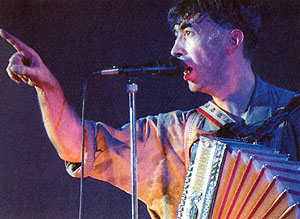 The
man has courage. At the peak of glory the innovator of folk music is
packing his bags in order to henceforth dedicate himself to film. Moment
of a long goodbye.
The
man has courage. At the peak of glory the innovator of folk music is
packing his bags in order to henceforth dedicate himself to film. Moment
of a long goodbye.
In the entrance hall of the Stuttgart Liederhalle, two young women look quite taken aback. "Are you sure that we are in the right concert here?" one asks in the face of the many people in their old age, dressed in smart leather shorts and designer Tyrolean jackets, hurrying purposefully straight to the wine bar.
No, they are guaranteed not to have arrived in Karl Moik's Musikantenstadl. It is quite right. Because: an essential characteristic of Hubert von Goisern's music is now that it attracts people of the most different ages and tastes.
And exactly now, at the high point of his many years of hard and slowly won popularity in Germany, the figurehead of new folk music decides to retreat from the music business?
"You know," says Hubert, "I have achieved everything, played in front of thousands of people, experienced unforgettable moments, now I simply need a new challenge. I hate the feeling of marking time."
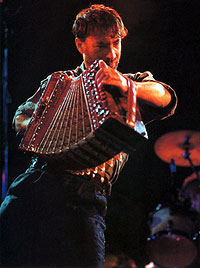 The
audience, on this evening at least, still has no idea about such plans.
Hubert von Goisern scarcely stands on the stage and snaps on his beloved
accordion in front of his body, before the hall is expertly howling and
cheering from every corner. A few sounds squeezed from the fall of the
accordion immediately arouse the suspicion that Hubert wants to make
the hearts of the crimped women in the hall beat faster with a yodel.
But just seconds later his band, the Alpinkatzen,
intervene. Stefan Engel hammers electronic bass eighths on his keyboard
and guitarist Reinhard Stranzinger immediately makes clear with a rousing
solo on his Stratocaster and duckwalk à la Chuck Berry, that he
can do much more than just mime the alibi guitar to tuba and alphorn.
The
audience, on this evening at least, still has no idea about such plans.
Hubert von Goisern scarcely stands on the stage and snaps on his beloved
accordion in front of his body, before the hall is expertly howling and
cheering from every corner. A few sounds squeezed from the fall of the
accordion immediately arouse the suspicion that Hubert wants to make
the hearts of the crimped women in the hall beat faster with a yodel.
But just seconds later his band, the Alpinkatzen,
intervene. Stefan Engel hammers electronic bass eighths on his keyboard
and guitarist Reinhard Stranzinger immediately makes clear with a rousing
solo on his Stratocaster and duckwalk à la Chuck Berry, that he
can do much more than just mime the alibi guitar to tuba and alphorn.
Meanwhile Hubert von Goisern himself remains noticeably static. With red-rimmed eyes, he creeps through the beginning, really shattered by a strong cold. He is not on top form, everyone who has seen him before feels that. Other than a bubbly chatterbox of stories from the folklore sphere, he limits himself to standards today, is not as jovial as usual in the few performances between the titles, but rather thoughtful, even philosophical. So the introduction to Kuahmelcher, terribly witty on other days because it is very satirised, about the development of the driving of the cows up the meadow and turbo cows with Brussels mega-udders seems gentle, the etymology of yodelling based on the isolation of the herdsmen also one to be addressed to a private circle of listeners.
Hubert von Goisern is certainly not the only one who is wrangling with his handicap. A week before, drummer Wolfgang Maier grabbed hold of a piece of broken glass and cut the tendon of his thumb. "But since he did not want to do without his beloved drums, Wolfi is playing with just one hand!" Hubert explained to the fans. In order to be prepared for all occasions, they speedily engaged Evert van der Waal as a second drummer, who supports him on a second drum set and after only two rehearsal days, contributes to the fact that the two already drum an astounding homogeneous drive.
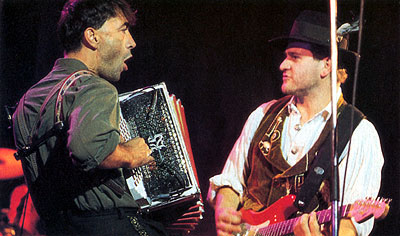 When
Hubert lets the Stones classic I
Can't Get No Satisfaction leaves its mark as lead-in to Spinni,
not only lovers of the Rolling Stones click
their tongues. "Now I play these traditionals or folk tunes," he
flirted with a pronounced American accent. The often native melodies
lead again and again into crashing rock or forced blues - the German
national anthem too, sung by Alpine Sabine in flawless mezzo soprano,
breaking its banks into a wild alpine polka.
When
Hubert lets the Stones classic I
Can't Get No Satisfaction leaves its mark as lead-in to Spinni,
not only lovers of the Rolling Stones click
their tongues. "Now I play these traditionals or folk tunes," he
flirted with a pronounced American accent. The often native melodies
lead again and again into crashing rock or forced blues - the German
national anthem too, sung by Alpine Sabine in flawless mezzo soprano,
breaking its banks into a wild alpine polka.
"Today I played more with closed eyes than open," he says later. "I had to conserve my strength in order to be able to get through the programme." Perhaps the memory in humorous interludes of hearty laughter helped him, which he always gets when he loosens up the show by means of short speeches.
"Are there are any Goiserers here?" he asks into the dark hall. "No, if there were Goiserers here, they would never say anything!" he knows his villagers from the Salzkammergut only too well and instead supplies his anecdotes from the history of the small spa town, where the residents pretend to be ill and go about consciously slowly, "only because of that, all the patients and infirm who come into this therapeutic bath feel equally better."
And again one of these grooves dominates, which sounds like a cross between Pink Floyd and Frankie Goes To Hollywood and furrows through the popular refrain. Suddenly a bright light twitches up - the show is at an end. Within seconds not only the two as notorious as they are ecstatic young visitors from row seven have demanded - lively, leaping for a full hour - but the whole hall, who demand his encore with a concentrated voice and also get it.
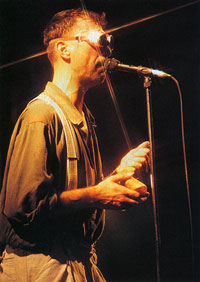 Furious
finale: At last Hubert and the Alpinkatzen come
out with the "dicken Wadeln", for which naturally everyone
had been waiting and the refrain of which is sung along to by a thousand
voice choir, also without it moving one pair of lips on stage.
Furious
finale: At last Hubert and the Alpinkatzen come
out with the "dicken Wadeln", for which naturally everyone
had been waiting and the refrain of which is sung along to by a thousand
voice choir, also without it moving one pair of lips on stage.
The concluding bow before the audience is barely over, he changed his mind again and puts the sentimental Hearst es net, wia die Zeit vergeht behind him, the last musical tears to this town so to speak, before they will be forgotten in another tomorrow.
But are they really the last tears? While the majority of the crowd are already taking themselves off in the direction of the car park, the alpine orchestra forms itself on the stage, in a semi-circle around one microphone and sings the final lullaby.
What comes after the music? "I don't know," confesses Hubert from Goisern, "Above all, I need peace in order to think about the things that are important to me personally, because during the long years of incessant tours, priorities shift."
Naturally he will miss the stage, the direct contact with the audience and also the magic of the moment. But Hubert is a restless person, a wanderer, a traveller, whom nothing and nobody can stop. "There are still a few alpine summits which I have not yet climbed, and the genre of film especially stimulates me."
This year he has played main male role in Hölleisengretl, a film of the book by Oskar Maria Graf. Apart from that, he is currently working on a screenplay. Is the departure from music irrevocably final? "Oh, who knows, perhaps it will itch me again in such a way that I can't do anything else but fall on music again. But at the moment, I feel like doing something new."
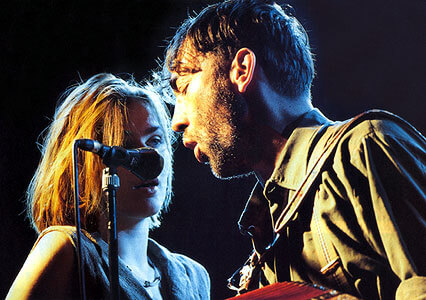
Hubert von Goisern - Live in 1994

Hubert von Goisern und die Alpinkatzen: Live in 1994
Photo: © Toni Glaser
Hubert von Goisern und die Alpinkatzen: Live in 1994
Photo: © Toni Glaser
Hubert von Goisern und die Alpinkatzen: Live in 1994
Photo: © Toni Glaser
Hubert von Goisern und die Alpinkatzen: Live in 1994
Photo: © Toni Glaser
Hubert von Goisern und die Alpinkatzen: Live in 1994
Photo: © Toni Glaser
Hubert von Goisern und die Alpinkatzen: Live in 1994
Photo: © Toni GlaserYodelling - the call of the wild alpine style
With both hands on her hips, Sabine Kapfinger slowly cut loose with a wordless message foreign to any language - but recognized by most people in the world. Kapfinger, her voice diving and whooping to the hum of a synthesizer, then switched gears by adding words as she matched the increasing tempo of an accordion. Together with the unified clapping of 3,300 people in the Offenbach (Germany) Stadthalle, Kapfinger and fellow musicians filled the auditorium with the sounds of new Austrian-German folk music.
The thread tying the instrumental music, clapping and mood was yodelling - a form of song popular among Alpine mountain people long ago. Now it's being revitalized with a new popularity by Hubert von Goisern and the Alpinkatzen, or the Alpine Cats, and other Austrian or German bands such as the Zillern Schürzenjäger. It's through a diverse formula combining rock, pop, blues, reggae, soul, funk and folk that master craftsman von Goisern, drummer Wolfgang Maier, guitarist Reinhard Stranzinger and keyboarder Stefan Engel have created a sound that pleases many.
Unfortunately for its legion of fans, the Austrian von Goisern and his band are calling an end to their careers as Alpinkatzen. The group will play its last concert in Munich, Germany, on Monday, von Goisern confirmed in a interview after the show. Von Goisern said he's going to "clear the table" and begin work on making films and new sounds. Looking back, the 41-year-old von Goisern said, it was "very, very hard"' to get radio airplay and tour promoters to set up concerts for new folk music back when he started the group in 1986.
Eventually, however, the Alpinkatzen's albums, coupled with extensive touring, led to widespread popularity amongst German and Austrians alike. Prior to this last Easter, the group even performed in the United States for a few dates in Austin, Texas and one in New York City.
The idea was to take folk music with its yodelling and accordion sounds, and mix them with more contemporary sounds like electric guitars and keyboards, the band leader explained.
"We make music that is indigenous to our landscape," he said. "Yodelling is just one part of our musical language." And, von Goisern pointed out, yodelling, is not just done by the people in the Alps, but also those in northern Scandinavia, the Arctic Circle and central Africa.
Von Goisern's lyrics, all sung in German, address both the good and bad aspects of life. Politicians, for example, come in for a bit of criticism in his lyrics. "They are not creative ... they are organizers," said von Goisern. "They never wanted it in a critical way. I'm critical with my tradition.''
In some of the more tranquil songs, fans flashed their lighters and waved sparklers to show appreciation. In the fast-paced numbers, the Alpine Cats received thunderous applause as if the crowd was begging for an encore.
The five-member group - temporarily assisted by a second drummer because Maier had a cast on his right hand/wrist area - gave a 1.5 hour show with two encores, divided by an intermission, without losing the crowd. That's unusual considering the differences in ages, which ranged from youngsters to elderly grandparents.
"Not all days are good days. Today was a bad day for me," said von Goisern, who was battling the flu. It's depressing, he added, when "I have to hold back in order to survive." The thought of cancelling a performance is unthinkable, he said. "I can't do it. I did it once when I had a stomach ache that was so bad."
As sick as he was, no one would've guessed as he displayed great musicianship through playing acoustic/slide guitar, accordion, harmonica and horn as well as yodelling and singing. One highlight was an accompaniment which consisted solely of cow bells.
Interestingly, the only instruments von Goisern said he can't play are the violin and cello. And, when asked how many he can play, he replied, "I never counted them."
HvG and the Alpinkatzen: Live in '93/'94

Hubert von Goisern und die Alpinkatzen: Live in 1993
Photo: © Toni Glaser
Hubert von Goisern und die Alpinkatzen: Live in 1994
Photo: © Toni Glaser
Hubert von Goisern und die Alpinkatzen: Live in 1994
Photo: © Toni Glaser
Hubert von Goisern und die Alpinkatzen: Live in 1994
Photo: © Toni Glaser
Hubert von Goisern und die Alpinkatzen: Live in 1994
Photo: © Toni Glaser
Hubert von Goisern und die Alpinkatzen: Live in 1994
Photo: © Toni Glaser
Hubert von Goisern und die Alpinkatzen: Live in 1994
Photo: © Toni Glaser
Hubert von Goisern und die Alpinkatzen: Live in 1994
Photo: © Toni Glaser
Hubert von Goisern und die Alpinkatzen: Live in 1994
Photo: © Toni Glaser
Hubert von Goisern und die Alpinkatzen: Live in 1994
Photo: © Toni Glaser
Hubert von Goisern und die Alpinkatzen: Live in 1994
Photo: © Toni Glaser
Hubert von Goisern und die Alpinkatzen: Live in 1994
Photo: © Toni GlaserThe "power from the mountains"
The phenomenon Hubert von Goisern: "Let the juchitzer out"
A "rag bag and junk room" is the so-called culture with which the professional folklore-rock and pop musician appears, barefoot, unshaven and in sloppy clothes. What traditional costume executive Max Reitner had strongly castigated last week, now stood, in the truest sense of the word, "personified", in front of the audience in the twice sold out Rosenheim Stadthalle: Hubert von Goisern, unshaven, and his Alpinkatzen, "Alpine Sabine" barefoot, guitarist Reinhard Stranzinger with jacket and a feather on his alpine hat over scruffy jeans, keyboard player Stefan Engel with long hair and hat and drummer Wolfgang Maier with little braids.
But not only that would have displeased the customs official, he would probably also have marvelled at the audience: from 5 to 75, with jeans or traditional dress, and the older fans clapped the loudest and at the encore stormed to the stage from their rows. Certainly Reitner would have wondered at what resounded from the loudspeakers: as a starter, a polka which rises to a hard rock, a four voice, sensitively performed folk song on parting and in between a mixture of rock, blues and folk music from Upper Austria - next to each other, at the same time or merged into one another and all in perfect harmony.
Omunduntn is the name of the tour of the now legendary Goiserer, who sets out to make rock with the diatonic accordion and the sounds of his homeland and in the meantime scores a success that almost frightens him. He is scarcely at home with his family any more, he regrets, and despite having already completed 20 concerts in almost daily succession - Rosenheim lay in the middle of the tour - he let himself be carried away by the audience again, who he had swept away beforehand.
The first song was clapped along to and that went through the whole concert, although Goisern kept the successful pieces for the encore. But the new songs also have the "power that above all the people from the mountains have", as he used to say, energy which he does put first in the music but also more and more in the lyrics. There is an anti-drug Kokain Blues and even a political song which the record company would rather not have had, von Goisern says. There is the talk about lying politicians and journalists and about the war in the former Yugoslavia: "Ob Serb oder Krawat, um an jeden is schad" ("Whether Serb or Croat, each is a shame").
Maybe he would like to steer a bit against the image of alpine rocker, who is successful because he cowardly conforms [to the taste of the broad masses], - an image that the competition would so much like to attach to him, - unjustly so, as his almost overbearing creativity proved. It is really the "power" that is simply unrelenting and "ois van da Musi her kimmt" ("everything comes from music"), as the group sang in their farewell song. Here it does not matter from which music: the Ausseer Schottische becomes hard rock with screeching guitar, Haydn's national anthem a pastiche on national things ("Gott erhalte, Gott beschütze, unsern Kaiserm unsern Franz, Schubert, Klammer, Bekkenbauer, Gott beschütz den Vogerltanz ..." ("May God keep and protect our emperor our Franz, Schubert, Klammer, Bekkenbauer, may God save the birdy-dance") and a yodel demonstrates his affinity with the blues.
After initial hesitance, ever more powerful juchitzers to alpine rock also came from the audience: "Let them out - a juchitzer must really be let out," Hubert von Goisern gave the instruction and Sabine the perfect example. At the end, quite simply came "De Zeit hod Bestand, wo mia san beinand" ("The time that we spend together will endure").
In fact there remained with the audience something over and above the moment, becoming noticeable, something which music with deep native roots can be today - certainly more so than when the Original Unterkrainer appear at a homeland evening and show what certainly no-one in Upper Carniola or Bavaria has ever played or sung - shaven or unshaven. Pity that Mr Reitner could not experience it.
